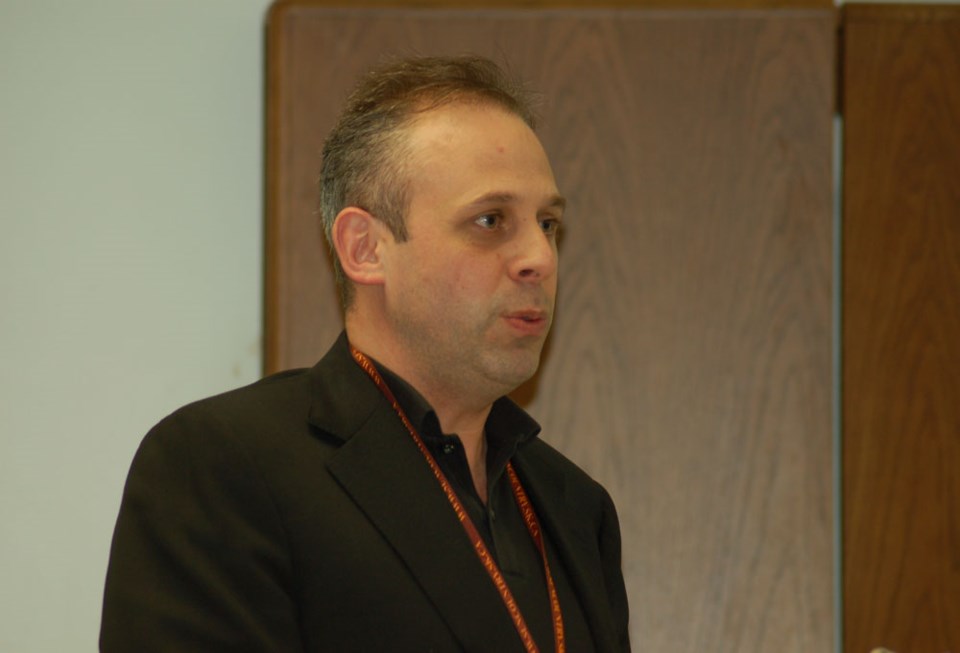The annual Sun Country Health Region Community Leadership Network evening attracted over 50 participants on April 30 when a few Sun Country board members and administration personnel met with other community leaders in the auditorium of St. Joseph’s Hospital.
The evening included several presentations, beginning with palliative care, moving on to an update on Lean management and then strategic planning elements.
The meeting was chaired by Gary St. Onge, an Estevan representative on the board of directors who introduced Brenda Freeman, the palliative care co-ordinator who provided valuable advice on such things as making informed decisions regarding end-of-life issues, maintaining quality of life, and family and caregiver support systems.
“It’s about what to expect when death is near,” she said.
“Reducing depression and anxiety are key,” she added.
Advanced care plans are a legal document that can help loved ones make the decision since they just have to follow pre-planned instructions, in other words, a living will, Freeman said.
“What are your wishes for when you may no longer be able to speak for yourself?”
Freeman advised that everyone appoint a proxy who will “respect your wishes.”
Recording the manner in which you wish to depart, is one good way to ensure the end-of-life decisions are carried out according to your plan while relieving pressure on others.
Chris McKee, the Kaizen promotion office executive director, led the group through information surrounding Sun Country’s use of Lean management and technology to improve efficiencies across the system. Using a recent Weyburn General Hospital pilot project for some illustrations McKee provided information and explained what is being done and what can be done with regards to improving efficiencies across the region.
McKee reported that over the past year the region, with its nearly 2,400 employees, carried out eight improvement projects and 20 training sessions while getting 11 leaders certified to provide training. Another 13 are currently in intensive training programs.
“Who doesn’t want to reduce wait times? Who doesn’t want to reduce their walking distances and time spent searching for something. Those aren’t high on anybody’s priority list,” he said regarding on-the-job routines.
One area where strong advancements were made was long-term care admissions. Other points of care such as primary health care clinics were also sources for improvements, he said.
Training sessions were held in 17 of the region’s 28 facilities in 2014.
“This stuff is not new, we’re just trying to mistake-proof various areas and certain projects and that includes things like medication reconciliation or delivery of therapy equipment, as examples,” said McKee.
Sun Country’s president and CEO, Marga Cugnet introduced the next three speakers who delivered information on various strategic plans.
Janice Giroux, vice-president of community health spoke on access to health care teams, the formation of these teams, and educating the public on alternative services that can be used other than emergency wards.
Stop the harm/stop the line strategies were outlined by John Knoch, vice-president of corporate and finance for Sun Country. He spoke on specific safety issues that confront the health region..
“We collect the stories, collect the details and learn so we can prevent them from repeating,” he said, noting that when it came to critical events, the idea was to respond to the issue within 48 hours, even if the problem is not an easy fix. Preventing staff injuries was one important component, he said, but changing the culture in the workplace is not always easy.
Chris Cechini, vice-president of human resources spoke on items such as employee morale, reducing overtime costs and changing any negative behavious that may have evolved over time. In the end, he suggested, “it’s staff that implements change, we just give managers the tools.”
Cugnet explained that 2014 was a year of transition for Sun Country wherever they received some positive front-line feedback, not only within this region but also from other health regions across the province.
Board chairwoman Marilyn Charlton wrapped up the evening’s program by providing information to the group regarding the possibilities of becoming a Sun Country board member, and how to go about applying for that role. It had been noted, earlier, the other Estevan representative on the Sun Country board, Lori Carr, had been asked to step down following her successful run at being nominated as the Sask Party candidate in the next provincial election. Carr told the Mercury that even though she is still just a “candidate in waiting,” there could be a perception of a conflict of interest when it comes to the health board deliberations, so the ministry had requested her resignation which she did, after about eight years of service as a board director. All appointments to health region boards in the province are made by the provincial government.
There was also a brief discussion involving a small delegation from Fillmore who wanted the administration to address the recent cutbacks to X-ray and laboratory services in their community. Some possible solutions were explored, including an expansion of the service from a casual posting to a full-time position by having the laboratory and imaging technician serving not only Fillmore, but also the communities of Stoughton and Arcola.
An impending physician shortage in Fillmore had already been addressed, said Cugnet, noting that visiting physician services have been arranged, once Fillmore’s current doctor retires.




